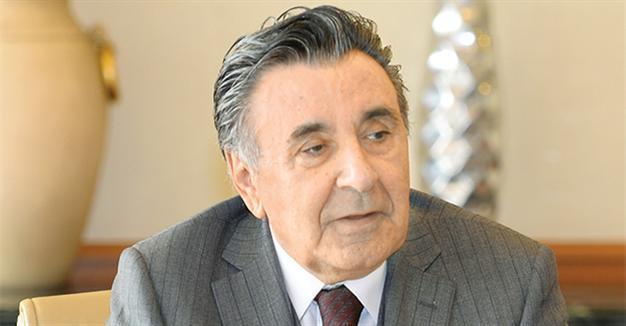Doğan calls to ‘band together’ against terror
MUĞLA – Doğan News Agency

Doğan Holding Honorary Chairman Aydın Doğan has called on Turkey to “band together” in order to put an end to terrorism, during a Doğan Publishing Principles Committee meeting held in the Bodrum district of the Aegean province in Muğla on June 17.
Hürriyet Chairwoman Vuslat Doğan Sabancı and Doğan Publishing Group representative Mehmet Ali Yalçındağ also attended the meeting, in addition to members of the group’s committee and editors-in-chief of its publications.
“We need to band together as a nation and cooperate to end terror. Whether it be the PKK [outlawed Kurdistan Workers’ Party] or ISIL [the Islamic State of Iraq and the Levant], we need to continue the fight against all forms of terror, without making a distinction,” Doğan said in his address to the participants, while extending his condolences to the families of “over 500 officers and police who were martyred in the past year.”
Doğan criticized the propaganda efforts by a number of media outlets accusing Doğan Holding of “supporting terrorism,” defining the claims as “ridiculous.”
“We, the media, condemn and curse all acts of terror. Our publications are clear and definitive,” the honorary chairman said, adding such accusations “do not inflict harm on us but weakens the fight against terror.”
As part of his remarks, Doğan also touched upon an ongoing rift between the ruling Justice and Development Party (AKP) and opposition parties over abolishing Turkey’s parliamentary system for a strong presidential system.
“On the matter of the constitution, another priority of the government, we need to wait for the developments. Mr. Prime Minister [Binali Yıldırım] stresses that the constitution should be amended to come in line with the notion of an elected president while leaders of opposition parties continue their [negative] stance against a presidential system. As media, our responsibility lies in informing the public about systems [of governance.] We need to inform the public in an objective manner, studying the applications [of the systems used] around the world,” Doğan said.
A recent recognition by German lawmakers of the World War I-era killings of Anatolian Armenians at the hands of the Ottoman Empire as “genocide” was another issue discussed by the chairman, as he “condemned” the Bundestag’s June 2 approval of a resolution entitled “Remembrance and commemoration of the genocide of Armenians and other Christian minorities in 1915 and 1916.”
“The German parliament’s decision on allegations of a so-called genocide was unfair and irrelevant. I condemn this decision,” he said, arguing against parliaments acting as “judicial authorities.”
“The allegations that we have been steering some media outlets in Germany are utter nonsense. We do not have an intention, a power or an effort to steer German media. I want to express this clearly,” Doğan stated.
Doğan also warned against a rise in radical tendencies across the world, especially xenophobia and Islamophobia.
“The rhetoric of enmity, especially against Muslims, that is prevalent in the election campaigns in Europe and in the United States truly saddens me. Some do not avoid exploiting Islam, a religion of peace and tolerance, for their dark and violent actions, while others exploit these marginal incidents and ahodopt a defamatory and exclusionist rhetoric against the Islamic world,” he said.
“I believe that we, as media, need to convey the harms of this unhealthy and conflictual environment to the society in the most correct manner. We should also be louder in our calls for common sense. In this general environment that I have been trying to depict, independent and objective publishing is increasingly more important,” Doğan added.
Doğan also clarified the debate surrounding Petrol Ofisi (POAŞ), an oil refinery retailer previously owned by Doğan Holding, defining the indictment as “baseless” and “inconsistent.”
“Our job is difficult. On the one hand, we are attacked by some segments of the media almost every day. On the other hand, we are struggling against cases – all of which are legally bizarre,” Doğan said, adding the last example of this was the POAŞ indictment.
“We have come face-to-face with an indictment that is completely baseless, inconsistent and acontextual. I should not repeat myself as we have already announced it to the public,” Doğan stated, referring to a March 23 statement issued by Doğan Holding responding to seven “baseless claims” about POAŞ. The statement underlined that the retailer had been cleared through tax examinations and lawsuits several times before.
“We will continue our legal battle against this indictment, which is against reason, logic, the law and conscience, [which claims] the formation of a criminal organization to evade a non-existent tax. We trust objective law and our rightfulness,” he said.
The honorary chairman nonetheless called for reconciliation, as Turkish society remained increasingly polarized.
“In this environment of polarization in Turkey, it is necessary to reconnect opposing sides, to find points of reconciliation. Independent and objective publishing is one of the components that can best support this [effort]. Becoming part of the polarization, adopting a partisan stance [on] every issue, increases the polarization and prevents people from understanding each other. Despite all hardships, we are working towards ensuring independent, diverse and objective publishing,” Doğan told the audience.
 Doğan Holding Honorary Chairman Aydın Doğan has called on Turkey to “band together” in order to put an end to terrorism, during a Doğan Publishing Principles Committee meeting held in the Bodrum district of the Aegean province in Muğla on June 17.
Doğan Holding Honorary Chairman Aydın Doğan has called on Turkey to “band together” in order to put an end to terrorism, during a Doğan Publishing Principles Committee meeting held in the Bodrum district of the Aegean province in Muğla on June 17.